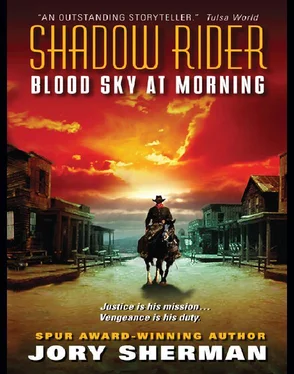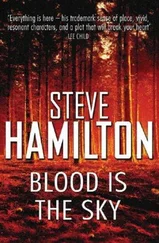“Do we ever know who we truly are?” Zak said. “Do we know our fathers and mothers? Can we trace their bloodlines in ourselves? Or do we forge ourselves in their molds so that we look and act the same? If so, that is very sad, and it makes the world a sad place to live.”
“The world is a sad place to live,” she said, so softly he had to strain to hear it.
“Someday, maybe, if the world keeps growing as it is, as people mingle and marry and leave children to grow, we will all have the same bloodlines. As it was in the beginning.”
“The beginning?” she asked querulously, as if she was lost in the fabric of that world he was weaving with his words.
“Adam and Eve.”
“The first man and woman,” she said.
“Yes. We all sprung from that same seed. Or so the Bible says.”
“I do not believe that. We are not all from the same seed. That seed did not carry the blood of blacks and red men and Chinese.”
“Skin colors do not matter. A man bleeds the same red blood, no matter the color of his skin.”
“Inside, you mean? We are all the same?”
“Yes. Maybe.”
“It does not matter to me. I do not think of such things. I know who I am. I know where I came from.”
“But do you know where you are going?” he asked, and the question went unanswered as Carmen drew back into herself and wended her way through that labyrinth of reasoning, that maze of bewilderment that faced each person who tried to plumb the depths of life’s true meaning.
“You could save some lives if you tell me how many men are at the next station and, maybe, what kind of men they are. We could spare their lives if they have wives and children and just want to ride on instead of fighting us.”
“I might tell you who is there,” she said, sounding almost like a pouting child.
“I wish you would. Before we get there. Otherwise, we have to assume they will not ride away and we will have to kill them.”
“They are just men. They work for Ferguson, too.” She paused. “Like my husband.”
“Do you know these men?”
“I know their names. They are—”
She broke off and he wondered what she had been going to say. He could see that she was troubled by his questions, by her thoughts about the two men manning the line shack, the way station. Perhaps, he thought, she was worried about her husband as well.
“Are you Catholic?” she asked.
“No.”
“I am Catholic. So is my husband. The two men at the little post house are, how do you call them, heathens?”
“They do not believe in God?”
“They believe in money. They bring death with them. That is why they work for Ferguson.”
Her words were laden with a sudden bitterness. He sensed that she wished things were different. That her husband did not work for Ferguson, that he did not mingle with such as those two he would soon have to face.
“You do not like Ferguson?” he asked.
She spat. “Filth. Greed. That is what he is. I do not like him.”
Zak let out a breath. “These men…they are gunmen?”
“Yes. They carry guns. I have heard my husband speak of them. They are robbers. Murderers. These are the kinds of men Ferguson hired to drive away the Chiricahuas. Bad men.”
“You do not want this?”
“I do not care,” she said. “Nor does my husband. He does not care about Indians, and neither do I.”
But she did care. He knew that. Her voice quavered when she spoke of them, and he sensed that she was a dam about to break. She had been alone for a while. With only her thoughts. Now, she had someone to talk to about things she held inside. But he would not draw them out. It would be like lighting a fuse on a stick of dynamite.
“How far to the line shack?” he asked, more to change the subject than to garner information.
She looked around. For landmarks, he thought. Then she looked at the wagon tracks, what was left of an old stage road, as if trying to recall memorable features.
“I know there is more distance between the next one than between all the others. My husband told me this. We will not reach it while the sun is still shining. It will be dark by the time we get to it.”
“How do you know this?”
“Because when we left that station, it was dark when we arrived at the other, where Julio left me.”
“Then it will be dark,” he said. “And maybe that is a good thing.”
“You will sneak up on them,” she said.
“I will talk to them. If you will tell me their names.”
“You want to know who you kill.”
Stubborn, she was. Honing in on his words like some bird of prey, pouncing on them with a sharp beak, trying to rip them to shreds.
“So I can call them out. Reason with them.”
“To do what?”
“To leave that place without shedding blood.”
She uttered a wry laugh, a mirthless laugh that was like the crackle of dried corn husks.
“They are called Lester Cunningham, he is the oldest, and Dave Newton. Dave has the hot head, how you say it, and Lester, he is the quiet mean one, who is always thinking, who always undresses me with his eyes to make me naked in his mind. Julio does not like him. He does not trust him.”
“And this David, your husband trusts him?”
“No, but Julio says he is like the cocked pistol with the hair trigger. Muy peligroso .”
“Very dangerous, yes.”
They rode on as the sun fell away in the sky, burning into their eyes, and they had cold tamales she had made when they stopped at a small spring just off the wagon path. Zak complimented Carmen on her cooking, even though the meat was old and tough, the cornmeal too salty.
Jimmy Chama had been quiet during the meal, but now, as he sat in the shade of his horse’s belly, he spoke to Zak.
“I heard you talking with Carmen,” he said. “We will reach the way station after dark.”
“Yes.”
“What will you do?”
“I will talk to the two men there, tell them to go back to Tucson or die.”
“You want me to back you, then. And who will watch Carmen?”
“No, you watch Carmen. And wait. I will talk to them. See if they listen to reason.”
Carmen laughed that dry toneless laugh of hers, that scoffing laugh that was at once a sign of wisdom and disbelief.
An old wooden stock tank, the tar in its seams badly shrunk and deteriorated, sat on decaying four-by-four whipsawed beams, the water inside, at the bottom, scummed over with green algae. A lizard lay along the top board, blinking its eyes, wondering if it should venture down into the tank. Zak watched it, knowing that the creature would probably drown if it ventured down to the stagnant water. Flies buzzed around the tank in aimless patterns, rejecting the lizard as a source of food.
“That Lester,” she said, “he is always looking. He will see you, or hear you, and then his gun will talk to you. His gun does not reason.”
“She’s probably right,” Chama said. “You will go up against two men. If one doesn’t get you, the other one will.”
“Yes,” Carmen said, her breath hissing over the sibilant like a prowling serpent.
Zak drew a breath.
“I will have the night,” he said. “Before the moon is up. I will be only another shadow in the darkness. They’ll hear my voice, but they won’t see me.”
“Ah,” Chama said. “You will be the shadow, eh. Is that why you are called Jinete de Sombra , the Shadow Rider?”
Zak did not answer.
Carmen looked at Zak, shaken by Chama’s question. As if she knew. As if she had heard the appellation before, somewhere. She ate the last of her tamale and washed it down with water, her throat suddenly dry and clogged with meat and masa flour.
Zak looked up at the sky and the puffs of clouds. The sun had coursed lower on the horizon and would soon set, drawing the long shadows of afternoon into a solid mass, like a burial shroud.
Читать дальше












